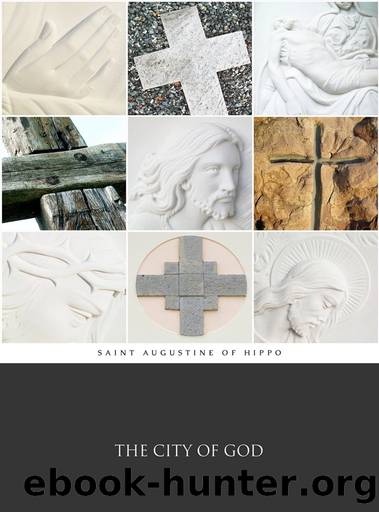The City of God by Saint Augustine & Marcus Dods

Author:Saint Augustine & Marcus Dods [Augustine, Saint]
Language: eng
Format: azw3
Tags: Religion, History, Philosophy, Classics, Theology
ISBN: 9780307764768
Publisher: Modern Library
Published: 0426-01-01T00:00:00+00:00
1 Matt. x. 28.
2 On this question compare the 24th and 25th epistles of Jerome, de obitu Leæ. and de obitu Blesillæ filiæ. Coquæus.
3 Ps. xlix. 12.
4 On which see further in de Peccat. Mer. i. 67 et seq.
5 De Baptismo Parvulorum is the second half of the title of the book, de Peccatorum Meritis et Remissione.
6 1 Cor. xv. 56.
7 Rom. vii. 12, 13
8 Literally, unregenerate.
9 John iii. 5.
10 Matt. x. 32.
11 Matt. xvi. 25.
12 Ps. cxvi. 15.
13 Much of this paradoxical statement about death is taken from Seneca. See, among other places, his epistle on the premeditation of future dangers, the passage beginning, âQuotidie morimur, quotidie enim demitur aliqua pars vitæ.â
14 Ecclus. xi. 28.
15 Ps. vi. 5.
16 Gen. ii. 17.
17 Gal. v. 17.
18 Gen. ii. 17.
19 Gen. iii. 9.
20 Gen. iii. 19.
21 Wisdom ix. 15.
22 A translation of part of the TimaEus, given in a little book of Ciceroâs, De Universo.
23 Plato, in the Timæus, represents the Demiurgus as constructing the kosmos or universe to be a complete representation of the idea of animal. He planted in its centre a soul, spreading outwards so as to pervade the whole body of the kosmos; and then he introduced into it those various species of animals which were contained in the idea of animal. Among these animals stand first the celestial, the gods embodied in the stars; and of these the oldest is the earth, set in the centre of all, close packed round the great axis which traverses the centre of the kosmos.âSee the Timæus and Groteâs Plato, iii. 250 et seq.
24 On these numbers see Groteâs Plato, iii. 254.
25 Virgil, Ãneid, vi. 750, 751.
26 Book x. 30.
27 A catena of passages, showing that this is the catholic Christian faith, will be found in Bullâs State of Man before the Fall (Works, vol. ii.).
28 1 Cor. xv. 42.
29 Prov. iii. 18.
30 1 Cor. x. 4.
31 Cant. iv. 13.
32 Ps. xlii. 6.
33 Ps. lix. 9.
34 Those who wish to pursue this subject will find a pretty full collection of opinions in the learned commentary on Genesis by the Jesuit Pererius. Philo was, of course, the leading culprit, but Ambrose and other Church fathers went nearly as far. Augustine condemns the Seleucians for this among other heresies, that they denied a visible Paradise.âDe Hæres, 59.
35 Tobit xii. 19.
36 Gen. ii. 17.
37 Rom. viii. 10, 11.
38Gen. iii. 19.
39 âIn uno commune factum est omnibus.â
40 Rom. viii. 28, 29.
41 1 Cor. xv. 42â45.
42 Gen. ii. 7.
43 1 Cor. xv. 47â49.
44 Gal. iii. 27.
45 Rom. viii. 24.
46 1 Cor. xv. 21, 22.
47 Gen. ii. 7.
48 John xx. 22.
49 Gen. ii. 6.
50 2 Cor. iv. 16.
51 1 Cor. ii. 11.
52 Eccles. iii. 21.
53 Ps. cxlviii. 8.
54 Matt. xxviii. 19.
55 John iv. 24.
56 âBreath,â Eng. ver.
57 Gen. i. 24.
58 Ecclus. xxiv. 3.
59 Rev. iii. 16.
60 1 Cor. xv. 44â49.
Download
This site does not store any files on its server. We only index and link to content provided by other sites. Please contact the content providers to delete copyright contents if any and email us, we'll remove relevant links or contents immediately.
The Lost Art of Listening by Michael P. Nichols(6461)
Why I Am Not A Calvinist by Dr. Peter S. Ruckman(3765)
The Rosicrucians by Christopher McIntosh(3046)
Wicca: a guide for the solitary practitioner by Scott Cunningham(2702)
Signature in the Cell: DNA and the Evidence for Intelligent Design by Stephen C. Meyer(2495)
Real Sex by Lauren F. Winner(2466)
The Holy Spirit by Billy Graham(2408)
To Light a Sacred Flame by Silver RavenWolf(2350)
The End of Faith by Sam Harris(2279)
The Gnostic Gospels by Pagels Elaine(2023)
Nine Parts of Desire by Geraldine Brooks(2002)
Waking Up by Sam Harris(1952)
Heavens on Earth by Michael Shermer(1950)
Devil, The by Almond Philip C(1896)
Jesus by Paul Johnson(1882)
The God delusion by Richard Dawkins(1842)
Kundalini by Gopi Krishna(1821)
Chosen by God by R. C. Sproul(1754)
The Nature of Consciousness by Rupert Spira(1687)
